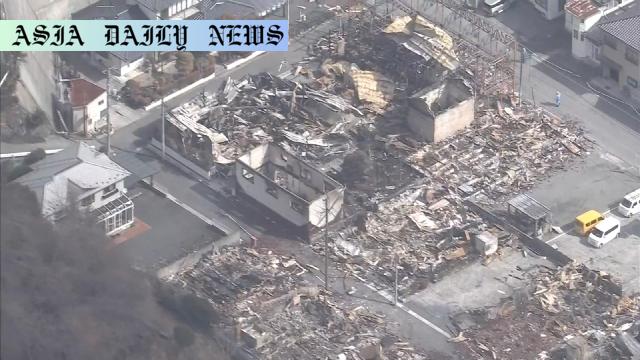Wildfire-hit Ofunato City issues disaster-victim certificates to help residents rebuild lives after significant damage.
- Wildfire-hit Ofunato City begins issuing disaster-victim certificates for residents to claim financial aid.
- Fires damaged over 200 buildings, with 76 homes completely destroyed, requiring residents to rebuild their lives.
- Residents affected need certificates to access public funding for recovery and rebuilding efforts.

The Scale of the Wildfire Damage in Ofunato City
The recent wildfires in Ofunato City, located in the northeastern region of Japan, have left an indelible mark on the community. The fires, which raged for nearly two weeks, caused significant destruction before being contained. In terms of structural damage, over 200 buildings were affected, and among these, 76 homes were completely destroyed. This widespread devastation has left countless residents without shelter and in dire need of support.
While the flames have been extinguished, the aftermath reveals a challenging road ahead for many individuals trying to piece their lives back together. Financial aid has become a lifeline for those affected, opening a pathway for rebuilding their homes and livelihoods. The city’s decision to expedite disaster-victim certificates has been critical in assisting residents during this recovery phase, enabling them to access much-needed public funds.
Government and Community Response
The government’s quick response was evident when the affected areas were surveyed promptly, allowing for the efficient issuance of disaster-victim certificates. For residents who lost homes and personal property, these certificates serve as a gateway to financial aid, significantly easing the burden of the rebuilding process. Among those applying is a local fisher in his 40s, who recounted losing both his home and warehouse, which also housed his fishing gear. Without the resources to resume his livelihood, he expressed hope that the certificate would help him take meaningful steps forward.
The community has shown remarkable resilience, with city officials working around the clock to ensure swift processing of documentation. This proactive effort highlights the importance of collaboration between local authorities and residents in addressing the immediate and long-term needs of a community ravaged by such disasters.
The Importance of Rebuilding Lives
Rebuilding after a catastrophe such as this demands more than financial aid—emotional and psychological recovery are equally essential. Many residents face an uncertain future as they cope with not only material losses but also the emotional toll of witnessing the destruction of their homes and personal belongings. Support services, including counseling, need to be made accessible for these individuals as they navigate this challenging period.
Moreover, the broader community must acknowledge and contribute to efforts aimed at helping individuals regain a sense of normalcy. Local businesses, charities, and international organizations could play an instrumental role in supplementing government efforts through additional funding, resources, and expertise. Such collaborative measures can enhance the city’s ability to recover quickly and effectively.
Learning from This Tragic Event
The tragedy in Ofunato underscores the urgent need for enhanced prevention and preparedness measures against wildfires. Climate change continues to intensify the frequency and severity of such incidents, prompting governments worldwide to reassess their disaster management strategies. For Japan, implementing sophisticated early-warning systems and conducting community-wide drills could go a long way in mitigating future losses.
Additionally, revisiting urban planning policies and incorporating fire-resistant materials in building designs could enhance resilience against such disasters. Policymakers and urban developers in Japan and beyond must work together to prioritize safety and sustainability, ensuring that communities are better equipped to face potential adversities.
The events in Ofunato City serve as a poignant reminder of humanity’s vulnerability to natural disasters and the resilience needed to rise above them. It is a call to action for both policymakers and the global community to prioritize efforts that minimize risks and empower communities to rebuild stronger than ever before.



Commentary
The Emotional Strain on the Residents
As I read about the devastating wildfires in Ofunato City, Japan, I am struck by the profound emotional and physical challenges faced by the affected residents. Losing one’s home and livelihood is a harrowing experience, and the fisher’s story deeply resonates with the bigger picture of the disaster. It is not just about the financial loss; there is a strong emotional component to witnessing your hard-earned possessions reduced to ashes. This emotional burden underscores the importance of providing not only monetary aid but also mental health support to help individuals through their recovery journeys.
The Role of Government and Community in Recovery
The proactive steps taken by local authorities in Ofunato to issue disaster-victim certificates highlight a strong commitment to the welfare of the community. This action is commendable and serves as an example of how governments can efficiently mobilize resources during times of crisis. However, recovery from such a disaster cannot be a lone endeavor by the government—it requires collective effort. Community members must come together to support affected families, sharing resources and providing emotional encouragement. Meanwhile, non-governmental organizations and volunteer groups could play a pivotal role in supplementing these efforts.
Preparing for the Future
One of the recurrent themes in disaster-struck areas is the need to bolster prevention and preparedness efforts. Ofunato’s story should serve as a wake-up call to other regions vulnerable to wildfires. It is imperative that countries invest in advanced technology for early detection and improve urban planning to withstand future catastrophes. More importantly, fostering a mindset of shared responsibility will go a long way in creating resilient communities. Each of us has a role in supporting policies and practices that increase safety and mitigate risks in the face of natural disasters.